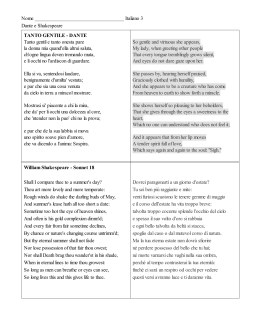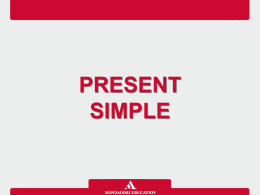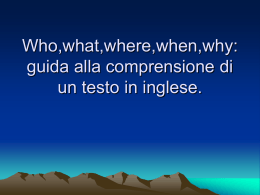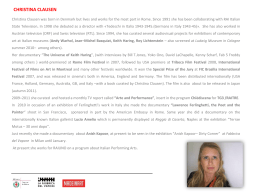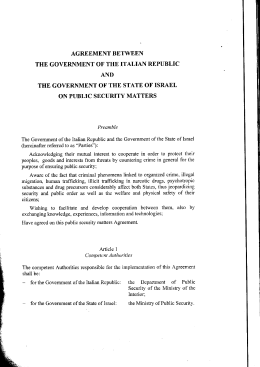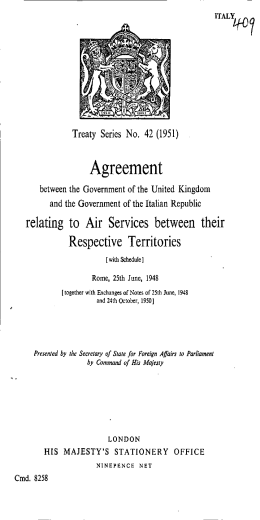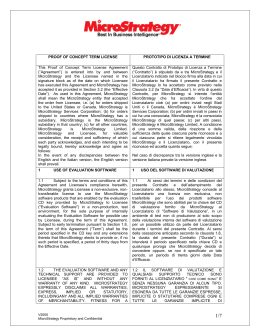10. LEGAL AND COMMERCIAL TEXTS LEGAL TEXTS The bad news: legal texts contain a lot of specialized jargon and terms that are not used in general communication. The good news: it is easy to find online dictionaries and to find examples of EU legislation in the languages of all the member states. http://eur-lex.europa.eu/legal-content/HR/TXT/HTML/?uri=CELEX:32001L0029&from=EN Directive 2001/29/EC of the European Parliament and of the Council of 22 May 2001 on the harmonisation of certain aspects of copyright and related rights in the information society AZ EURÓPAI PARLAMENT ÉS A TANÁCS 2001/29/EK IRÁNYELVE (2001. május 22.) az információs társadalomban a szerzői és szomszédos jogok egyes vonatkozásainak összehango DYREKTYWA 2001/29/WE PARLAMENTU EUROPEJSKIEGO I RADY z dnia 22 maja 2001 r. w sprawie harmonizacji niektórych aspektów praw autorskich i pokrewnych w społeczeństwie informacyjnym The characteristics of “legalese” • • • • • • • • • • • • The aim is to be flawless and entirely unambiguous Repetition of nouns to avoid the potential ambiguity of pronouns Apparent redundancy Syntactically complex sentences Highly specialized lexis Archaic terminology and Latin expressions Units of meaning. Taylor (p.127) gives the example of “statement of defence”, which translates as “replica del convenuto”, not dichiarazione di difesa Great use of conditional forms Deontic expressions (obligation): shall in English; dovrà/dovranno in Italian Formulaic expressions rarely used in other contexts: whereas/permesso che, in witness thereof/in fede di ciò Terms almost exclusively used in legal contexts: to sue/citare, far causa, summons/mandato di comparizione Performative expressions: it is hereby certified/certifica, I, the undersigned…/il sottoscritto “The distinction between English legal and ordinary English discourse is greater than that between legal Italian language and ordinary Italian.” Taylor, p. 129. He gives the following examples of legal expressions in English that differ enormously from normal language: Without let or hindrance: senza (alcun) impedimento Malice aforethought: premeditazione Force majeure: forza maggiore Aid and abet: essere complice Whereupon and wherefore: al che Goods and chattels: ogni sorta di beni mobili Null and void: nullo So your problem as English-to-Italian translators regards the source texts. Those translators who decide to specialize in legal texts find that their job gets easier as they acquire experience. Much of the terminology used is formulaic and recurs in one text after another. Sample documents are also available online. 2. TERM, TERMINATION & SURVIVORSHIP: This Agreement and all provisions hereof, except and unless otherwise provided, in writing, shall be in full force and effect and shall extend for a term of Twenty five (25) years for the U.S. and all other worldwide markets. The effective date of this Agreement shall be the date first written above. At conclusion of the initial term, this Agreement shall automatically renew for two (2) year periods thereafter, unless terminated by either of the parties upon six (6) months prior notice. In the event of any breach of any material provision of this Agreement, this Agreement may be terminated by either Party hereto, with sixty (60) days written notice to the other Party provided that, during the sixty (60) day period, the breaching Party fails to cure such breach, in which case ZGSI shall have six (6) months from the effective date of termination of this Agreement to sell any inventories of product existing, product already in production or on order as of said effective date of termination. Read more: http://agreements.realdealdocs.com/RoyaltyAgreement/LICENSING-AND-ROYALTY-AGREEMENT3110363/#ixzz3pZeoX2tL COMMERCIAL TEXTS Commercial correspondence Like legalese, the language of commercial correspondence is rather formulaic. Taylor (pp 131-135) gives examples of standard formulae used in both informal memoes and formal business letters. Today email has replaced the memo but the linguistic conventions are similar. For important business agreements involving huge sums of money, formal letters are still required. They may be scanned and sent as email attachments nowadays, but as regards language they are little different from the letters sent by post thirty years ago. ENGLISH ITALIANO Dear Sir/Madam, Thank you for your order (n. 26/74418). We are delighted to inform you that delivery will be carried out within the agreed time limit. Egregi Signori, Vi ringraziamo per il Vostro ordine (n. 26/74418) e siamo lieti di informarVi che la consegna sarà effettuata entro I termini stabiliti. Our warehouse staff tell us that they have started to prepare the consignment, which will be ready by the end of this month. The packaging instructions that you have provided will be carried out with all due care. Dal magazzino ci informano che hanno già iniziato a preparare la partita, che sarà pronta entro la fine di questo mese. Le istruzione di imballaggio che ci avete fatto pervenire saranno eseguite con la dovuta cura. The forwarding agent has sent us a quotation for all the expenses for transport of the goods, insurance and customs clearance. In the pro forma invoice herewith enclosed there is a list of all these costs along with the price of the goods. La spedizoniere ci ha fatto avere un preventivo per tutte le spese di trasporto, assicurazione e sdoganamento delle merci. Nella fattura proforma, che accludiamo, c’è un elenco di tutti questi costi, insieme col prezzo delle merci. ENGLISH ITALIANO As soon as we have been notified that a letter of credit has been issued in our favour, we will instruct our carrier to proceed and we will contact you as soon as possible. Non appena riceveremo notizia dell’apertura di una lettera di credito a nostro favore, daremo istruzioni al nostro trasportatore e Vi contatteremo al più presto. We look forward to hearing from you in due course. In attesa di Vostre notizie, Vi inviamo i più cordiali saluti. Yours faithfully, (Yours sincerely,) In a short text we have six technical terms: consignment, forwarding agent, customs clearing, pro form invoice, letter of credit, carrier. Note the use of carry out instead of execute. Due (adjective and adverb) = dovuto (“… with all due care.”) Due to = dovuto a Owe (verb) = dovere (soldi/un favore a qualcuno) FALSE FRIENDS 10 What do you remember about accurate and clamorous? Cognate: a word that has the same derivation as another word (victory/vittoria) Cognato/a: brother-in-law, sister-in-law Commedia: a play Comedy: a comic production for the theatre, cinema or TV Shakespeare’s plays fall into four categories: tragedies, comedies, history plays and problem plays. Commodity: merce. The village shop doesn’t just sell food but also a range of other commodities/goods: cleaning products, soap and shampoo, cosmetics, prescription-free medicines etc. Comodità: 1. Convenience. The convenience of living in the city centre is counterbalanced by the problem parking the car. 2. Comfort. When I buy shoes, comfort is more important than style. THE DIARY OF A BRAVE TRANSLATOR VERILY IN LEG – PART 10 My niece, Julie, has been getting on my nerves. She’s always complaining about how she feels stressed out all the time since the baby arrived. But for six years she did nothing but complain about how she desperately wanted a child but couldn’t get pregnant. In the end I told her straight: “Did you want the bicycle? Now pedal it!” But she still went on about how she doesn’t have any social life now because she has no one to babysit for her. “That was your choice,” I told her. “You can’t have the barrel full and the wife drunk.” She didn’t like that at all. In fact she told me to go and get myself blessed. You’ve made your bed. Now lie in it. You can’t have your cake and eat it. She told me to…… get lost go take a running jump piss off/fuck off (DANGER!) go forth and multiply (Biblical euphemism)
Scarica

